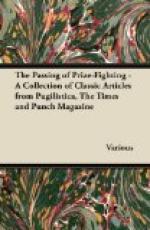[Herr SCHAEFF, writing in the Taegliche Rundschau on the spiritual grandeur of Germany, declares that the degradation of her enemies will not prevent her doing honour to those dauntless men who in enemy and neutral countries have stood for truth and actualities. “The time will come when we shall mention their names and call them our friends. After the War we shall do homage to these men and to their incorruptible conduct. We shall erect monumental brasses in their honour. They are heroes, and their memories shall be consecrated.”]
A literary spokesman of the Huns
Pays liberal homage to those “dauntless”
sons
Of hostile nations, who have all along
Maintained their fellow-countrymen were
wrong.
No guerdon for their courage is too great,
But, till the War is ended, they must
wait;
Then shall Germania, with grateful soul,
Inscribe their names upon her golden roll;
And “monumental brasses” shall
attest
The zeal wherewith they strove to foul
their nest.
Such homage no one grudges them in lands
Where eulogy for deep damnation stands;
But in the Motherland they still infest
How shall we treat this matricidal pest?
No torture, not the worst their patrons
use
On starving women or on shipwrecked crews,
No pain however bitter would requite
Their transcendental infamy aright.
Death in whatever form were all too mild
For those who at their country’s
anguish smiled.
Oblivion is by far the bitterest woe
England’s professional revilers
know,
Who joyously submit to be abhorred
But suffer grinding torments if ignored.
So let them live, renounced by their own
sons,
And taste the amnesty that spares and
shuns.
* * * * *
“Mrs. J.M. B—— (nee Nurse ——), a son.”—Scotsman.
Nurses, like poets, are born, not made.
* * * * *
THE PLAY’S THE THING.
Just outside Mrs. Ropes’ drive gates there lies a famous and exclusive golf course, and when she turned her house into a Convalescent Home the secretary wrote offering the hospitality of the club to all officers who might come under her care.
Nevertheless, when Haynes and I first arrived, we were both too languid and feeble for any more exacting form of athletics than spillikins and jigsaws, and it was some time before the M.O. gave us permission to go on the links.
“And remember,” he added, “gently to begin with. Stop at the thirteenth hole.”
* * * * *
“Of course,” I said apologetically to Haynes as we neared the club-house, “I was pretty putrid before the War, so I shall be simply indescribable now.”
“My dear chap, this isn’t going to be a match. Keep your excuses till we play serious golf. To-day’s just a gentle knock round. Here we are. I’ll go and borrow some clubs; you get a couple of caddies.”




